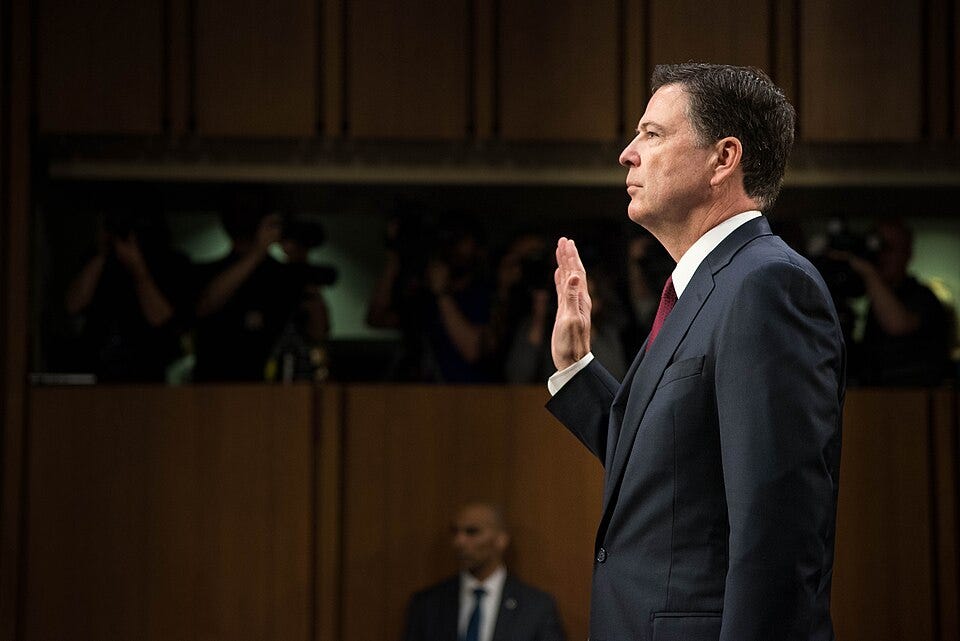NEWS: Remember these words: “selective” and “vindictive.”
As Trump's revenge investigations ramp up this week, concerned Americans wonder: what can possibly stop him?
Bottom Line Up Front
As the president’s investigations and prosecutions of his enemies accelerate, there are very few ways he can be reined in from ruining lives. But there are growing signs his targets will have a life raft. And they’ll have Trump’s loose lips to thank.
WHAT HAPPENED
This is already shaping up to be a busy week for Donald Trump’s revenge machine.
New York Attorney General Letitia James is set to be arraigned Friday, even after news reports revealed that career prosecutors were fired for recommending the case be dropped. James Comey has asked a federal judge to throw out his indictment, arguing that the case is “selective” and “vindictive.” John Bolton’s Espionage Act prosecution continues to raise serious questions about double standards in the Justice Department. And now, Trump’s prosecutors are reportedly investigating Georgia District Attorney Fani Willis — who once charged him with election interference — over a work trip to the Bahamas.
At this point, it hardly needs reminding that we’re talking about four of Trump’s most outspoken critics and four criminal investigations that have somehow “spontaneously” come into existence the year he returned to the presidency. Of course, they aren’t spontaneous. There’s one unmistakable pattern.
The flurry of activity shows how far we’ve come from the president’s aides assuring Americans that “success” would be Trump’s only revenge in a second term — to an administration that is unapologetically and furiously manipulating the justice system to prosecute his enemies.
James Comey’s case will be the most interesting to watch in the coming days. His team’s legal filing is exquisite, as Joyce Vance details on her Substack, and it meticulously documents how Trump publicly ordered the DOJ to prosecute Comey and then replaced officials who refused. The result was a farcical indictment brought just as the statute-of-limitations shot clock went off.
As for Letitia James, I’ll be watching closely whether she and her lawyers comment this Friday during her arraignment in Norfolk, Virginia. Two career prosecutors in the Eastern District of Virginia were fired days ago after opposing the case against her, and their boss — the original U.S. attorney who refused to bring charges — was forced out last month. His replacement, Trump lawyer-turned-prosecutor Lindsey Halligan, has shown herself to be the president’s unapologetic hatchet woman.
Also, there are more twists to come in the Bolton case. The “hot take” was that these charges were “more serious” than the others, but questions have grown ever since the indictment. Indeed, as The New York Times reports this week, Bolton’s case raises serious questions about whether he’s being singled out for behavior that Trump’s own team has engaged in but without consequences. Indeed, Bolton was charged with mishandling classified information, even as Defense Secretary Pete Hegseth, who apparently leaked war plans over the same unsecured app as Bolton, faced no inquiry.
Finally, the Fani Willis news isn’t surprising, given Trump’s ire at the Georgia prosecutor. According to reports, federal investigators are “scrutinizing” a training trip she took last year, paid for with campaign funds. Just weeks ago, Trump said Willis “should be in jail” and then — suddenly — she’s under investigation by the Justice Department. The administration doesn’t even appear to be putting in the effort to mask its intent anymore.
WHAT IT MEANS
Two words you’ll hear more as these cases move forward: “selective” and “vindictive.”
“Selective prosecution” means the government has enforced a law against one person while ignoring others who committed the same act. This is not because of the facts but because of who the person is. The Constitution forbids that. Prosecutors are supposed to pursue cases based on evidence, not identity or politics. But as with the Bolton case, the government’s double standard could come back to haunt them.
“Vindictive prosecution,” by contrast, means the government is punishing someone for exercising a protected right, such as speaking out, publishing a book, or criticizing the president. Both are among the rarest and most serious forms of government abuse recognized by the courts. When proven, they strike at the heart of equal protection and due process, which is the guarantee that justice applies to everyone and not just those singled out by a president.
Trump’s targets will be invoking these defenses often.
While I’m no lawyer, I’ve spent quite a bit of time talking to the best in the country. The legal threshold for dismissing a case as selective or vindictive is notoriously high (judges almost never grant it). Often that’s because the evidence of motive is buried deep inside the government itself, where only the perpetrators can see it. In other words, the very officials committing the abuses control the proof of it. That’s why these defenses are both legally fragile and morally urgent.
However, Donald Trump has made it easier for all of his targets. The pattern is unmistakable. Each of these investigations or prosecutions follows months or years of public threats from the president, purges of career prosecutors who resisted, and/or the installation of loyalists willing to “find” a crime. The trail of evidence of his malicious intent is long and wide.
WHAT’S NEXT
That said, even if Comey or James win in the near term and get their cases thrown out, the damage has already been done. The indictments, the headlines, the legal fees, and the humiliation have already happened. The whole process becomes a tail that will follow them forever. And at the risk of being repetitive these days, I’ll say it again: that is the point.
Trump doesn’t need convictions. His team clearly doesn’t care about bringing junk cases either. They want to scare people. They want every critic to think twice before speaking, every bureaucrat to flinch before defying him, and every journalist to pause before publishing. The process is the punishment, which should alarm all Americans because selective and vindictive prosecutions threaten all of our rights. If it can happen to “them” one day, it can happen to “you” the next.
And with the Trump administration preparing to take direct control of the IRS Criminal Division, the White House will soon have another weapon it can deploy against thousands and thousands of Americans. When this happens, the administration will theoretically operate the levers of power to financially investigate anyone who doesn’t agree with Donald Trump, with little-to-no outside scrutiny.
“What can be done?” many of you ask. Well, in these cases, courts can throw out politically motivated cases. Congress can investigate (if power changes hands to the Democrats). Inspectors general can open inquiries, which is what I’ve tried to press them to do in my case. But the truth is grim. None of these mechanisms can stop a determined president from using an investigative wrecking ball against his critics.
In the meantime, the best hope is the people themselves. Americans who speak out loudly against these abuses of power will keep the attention focused on them. The moral support will buoy Trump’s targets so that they punch back, rather then give into the nagging desire to retreat and settle. And, as I’ve found personally, the direct support makes it possible for people to actually defend themselves against unconstitutional retaliation with remarkable lawyers.
So remember these words. Selective. Vindictive.
They’ll define this era of lawlessness. They’ll appear in court filings, news stories, and history books alike, I suspect. And someday, when it’s all over, they’ll explain the moment that America learned what happens when justice simply becomes vengeance.
P.S. WHAT’S HAPPENING ON TREASON
Here’s what’s coming up.
TODAY / Tues, Oct 21 @ 3pET - Trump’s “War on Terror” with journalist
- I genuinely can’t wait for this conversation. Ken has been relentless in drawing attention to Trump’s counterterrorism order, NSPM-7, which could prove to be the most significant executive order of the administration. You can join here.TOMORROW / Weds, Oct 22 @ 12noon ET - Subscribers Only - Weekly Wednesday Coffee - If you’ve been missing these, I feel bad for you. Because we’ve had some amazing questions and back-and-forth. Join me and other subscribers for a private cup of Joe. You can join here.
Fri, Oct 24 @ 3pm ET - ex-CIA leader
- One of my all-time favorite guests is back with me. Former Trump intelligence chief Sue Gordon and I will take stock of the week — and what’s to come. You can join here.Mon, Oct 27 @ 3pm ET - The 2026 midterm fight begins w/ Senate Candidate Amy McGrath - She’s running for the open U.S. Senate seat in Kentucky, and she’s a fighter pilot with a laser-focus on democracy. Now is the time to start talking about how important the midterm elections are. You can join here.
Tues, Oct 28 @ 3pm ET - EXCLUSIVE - New Book Release - Autocrats vs. Democrats w/ Ambassador
- I will be welcoming former senior Obama official Michael McFaul for the official release of his new book, which you can pre-order online. His tome outlines America’s future on a turbulent world stage. You can join here.





This was a riveting read - thank you! One thing though: Trump’s tactics might in some ways be presently damaging to people who are standing up to him and his corrupt regime, but I believe history will uphold these brave, righteous Americans! And all of us who now admire and respect them will reassure them in the meanwhile …
Trump's methodology is clear: threatening those who speak or act counter to his "directives" and using fear as a tactic to silence people. As mentioned previously across social media, I've seen the effects of fear locally: fear of losing a job; losing one's business; losing friends and family members.
We the People showed our mettle on Saturday, we must keep it up via action: Speak out; write congress; make calls; protest; and boycott.